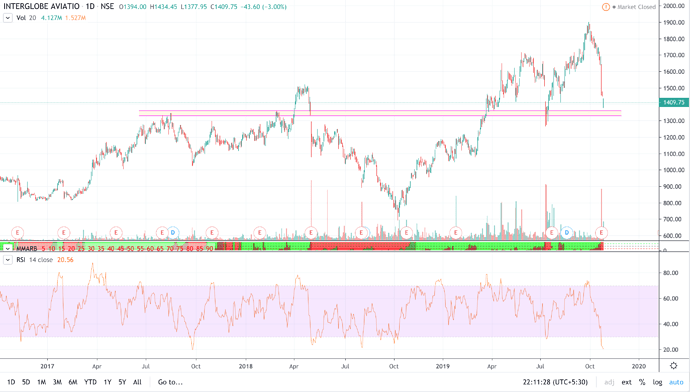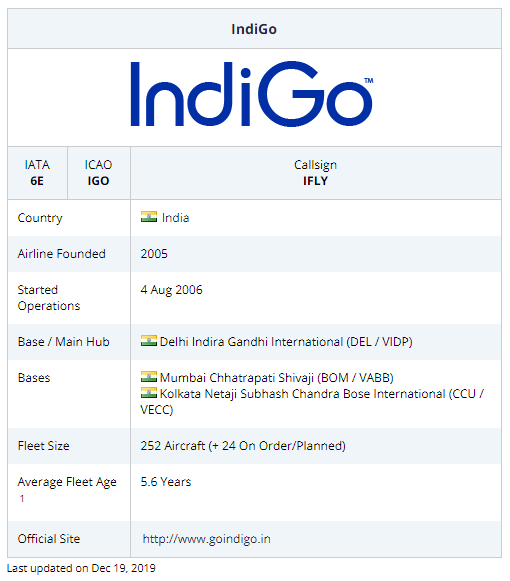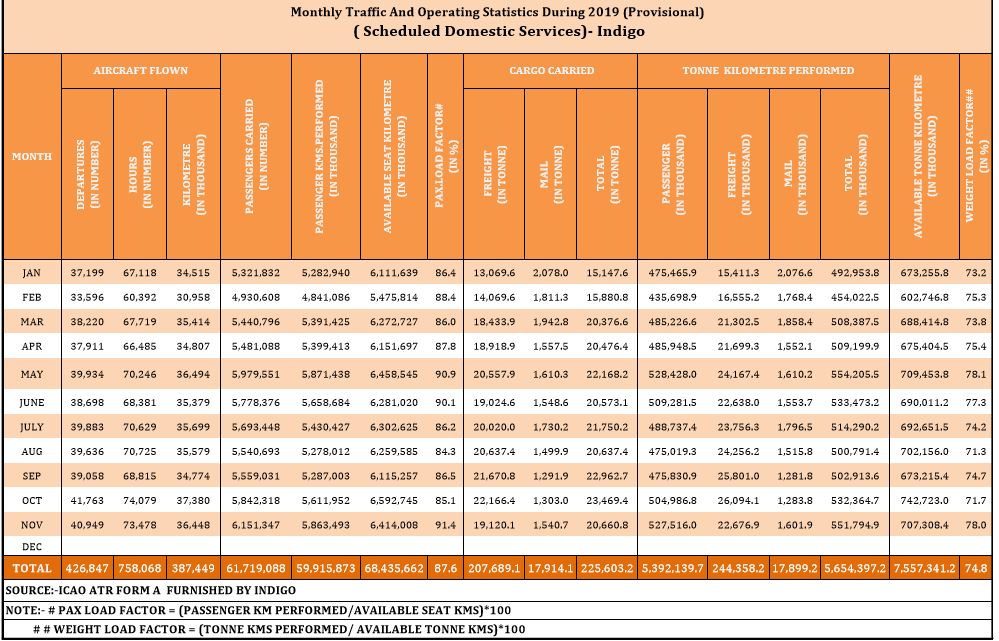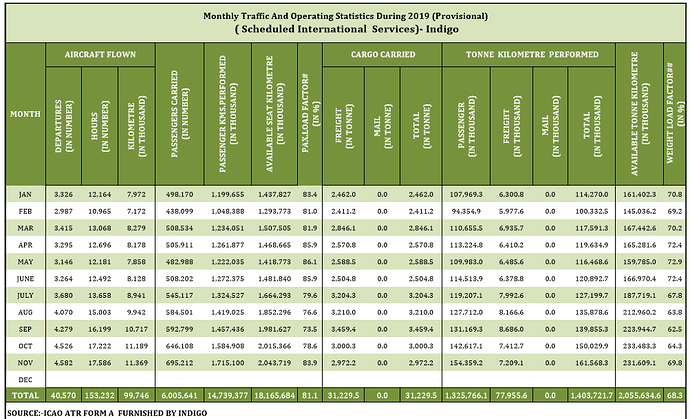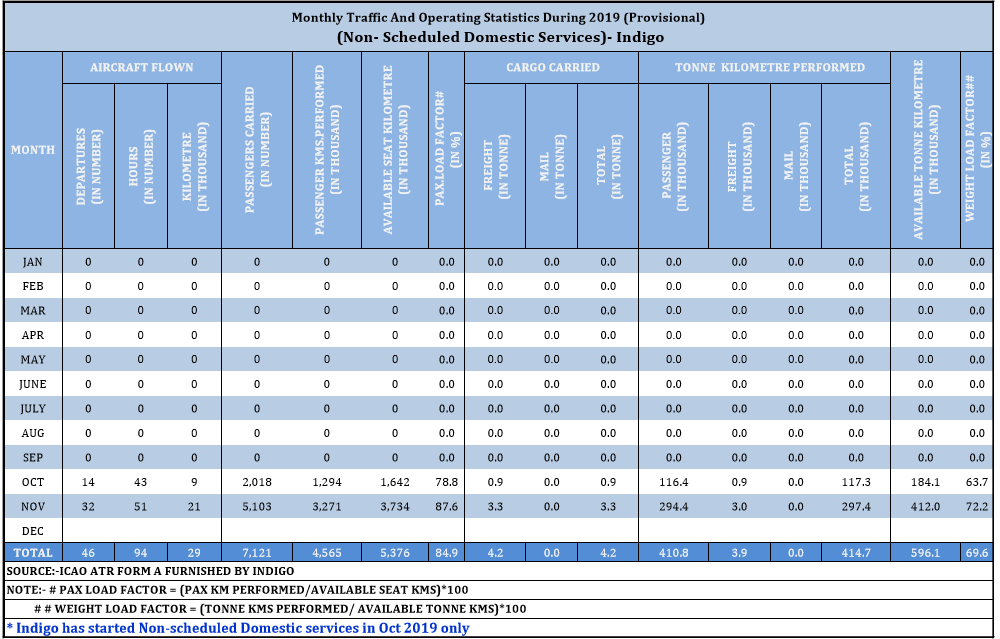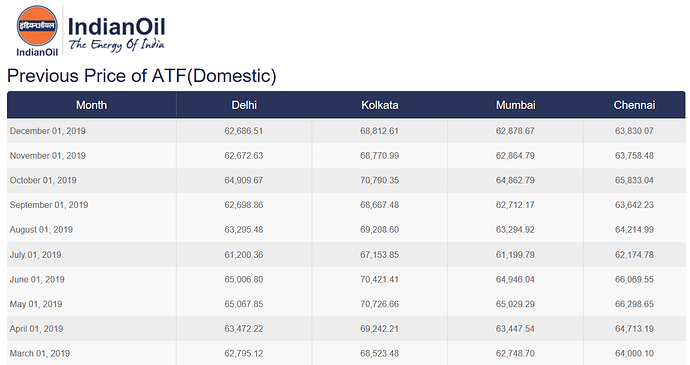The bad news just keeps flowing:
Oct-25:
Oct-28:
Oct-29:
Technically there can be a relief rally, as its oversold. Probably the clear direction would be visible once what IndiGo does after the 15 days deadline by DGCA.
Q2 '20 Earnings call transcript.
Link:
Q2’20 Conf call highlights
• Reported a net loss of 10.6 billion rupees with a negative after-tax profit margin of 13.1% compared to a net loss of 6.5 billion rupees with a negative after-tax profit margin of 10.5% during the same period last year. EBITDAR of 2.6 billion rupees with an EBITDAR margin of 3.2% compared to an EBITDAR of 2.2 billion rupees with an EBITDAR margin of 3.6% during the same period last year.
• Capacity grew by 24.2% on a year over year basis.
• Revenue from operations in the September quarter was 81.1 billion rupees, an
increase of 31% on a year over year basis. RASK for the quarter was 3.42 rupees compared to 3.23 rupees during the same period last year, an increase of 5.7%.
• For the quarter, yields increased by 9.4% to 3.52 rupees while load factors were down by 0.9 points at 83.5%.
• Fuel CASK decreased by 17.3% compared to 8.7% decrease in ATF prices on year over year basis.
• Cash balance at the end of the period was 187 billion rupees comprised of 87 billion rupees of free cash and 100 billion rupees of restricted cash.
• Better revenue performance during the quarter, the loss was driven by certain costs fall into three major categories:
Mark to market loss due to capitalization of operating lease liabilities
Re-assessment of accrual estimates for future maintenance cost
One-time adjustment owing to adoption of lower tax rates.
These cost items are non-cash in nature and does not reflect on the cash flows
• Opened 7 new domestic and 6 new international markets
• As per the DGCA reports, Indigo now have a 39% market share in the domestic cargo business, a significant increase from the 28% in the same period last year. International cargo capacity has grown by more than 80% on a year over year basis
• IndiGo was awarded the ‘Best Domestic Airline’ at FICCI’s first edition of Travel and Tourism Excellence Award.
• Extended the leases of most of existing ceos beginning 2016 and got around 50 used aircraft from the secondary market. As a result of this, the engines of these older aircraft are undergoing second shop visits which are significantly more expensive than first
shop visits.
• This maintenance cost should eventually go away around 2022 as the neos become a larger portion of the fleet and these older ceo planes are redelivered.
• To adopt the lower tax rates. This will lower effective tax rate and Indigo will no
longer be required to pay MAT which will result in lower cash tax outflow.
• In FY20 remaining two quarters, Indigo will have this elevated supplementary cost. And in FY21 will have a run rate which is lower than this. And then in FY22 would have a more neo fleet, which should kind of not give the supplementary rentals
• Currently no definitive answers on air india sale
Code share with Qatar Airways will be very useful as DGCA has asked to go slow on Turkey (expansion due to code share with Turkish airlines will be hampered).
I hope with this Indigo will further strengthen its international market share for domestic carriers.
And the code share has come at the right time.
https://wap.business-standard.com/article-amp/current-affairs/more-flights-for-saudi-arabia-as-govt-hikes-seat-quota-by-78-to-50-000-119110501508_1.html?__twitter_impression=true
IndiGo September 2019 update:
International ASK growth 117% yoy , 24% of its total capacity is now deployed towards international operations. Co also has a 24% market share amongst Indian flag carriers flying international.IndiGos international capacity is similar to spicejet’s total domestic capacity. TOTAL DOMINANCE!
Dominating, that too like a boss ![]()
Wishing Indigo GodSpeed.
customer mishandling continues…
That is why Indigo is diversifying its business into cargos and has of late started internationalization of its business. In short it is trying to reduce its dependency on dollar prices and also ups and downs of Indian economy
RG group has called for EGM. I have not clearly understood the purpose and motive behind it.
Can someone please help understanding this.
Thanks
Disc. Invested
In the Shareholders agreement which expired in last October, it says that if promoters want to sell their stake to someone else, they will require to take permission from the other promoter.
Now after expiry, rules will be followed according to the Article of Association which has the same clause.
Hence EGM by Gangwal’s group shows his willingness to either sell his stake to another party, or there will be amendment which will allow someone else to do capital infusion.
This is just guesstimate, but is the main cause of the EGM.
If you were a shareholder before dec 27, you can attend it as well.
Disclosure: Invested
This is a good detailed article on this issue.
Is anyone who is holding it, planning to attend the EGM?
DGCA extends deadline till May 31 for IndiGo to replace P&W engines
India’s aviation regulator announced that it has extended deadline for IndiGo to replace all 135 unmodified Pratt and Whitney (PW) engines from Jan 31 to May 31. The Directorate General of Civil Aviation (DGCA) had earlier directed the budget carrier to carry out replacements on 97 Airbus A320neo aircraft having turbine blades built with titanium by January 31, 2020 following a series of engine incidents. The airline will have to replace such aircraft with those having sturdier engine turbine blades built with nickel-chromium alloy. Last October, an Indigo A320neo heading to Pune suffered a problem with one of its engines during take-off from Kolkata. The aircraft returned to Kolkata and was grounded. IndiGo faced 13 incidents of engine trouble last year, including four in a single week in October.
CHARGES FOR AIRPORT SERVICES & AIR NAVIGATION SERVICES
https://www.aai.aero/sites/default/files/Airport-Charges-2016-17_0.pdf
Key in aviation is to have scale of operations Which indigo has but the overall cost for the replacement of engines may squeeze the profit .
Emerging trends or hot topics in air transport regulation
India’s domestic passenger traffic has risen by 18.6 per cent year-on-year to 138.97 million in 2018. In the wake of rising air traffic and development of new airports, the AAI has asked its officials to introduce digital transformations to make flying safer and to think of newer ways to reduce wasteful expenditure.
After deciding to privatise six major airports in February 2019, the central government is planning to privatise 20-25 more airports in the next phase, with an expectation that there will be a significant participation by foreign airports. Adani Group had won the bids to operate, manage and develop six airports at Lucknow, Ahmedabad, Jaipur, Mangaluru, Thiruvananthapuram and Guwahati, which the AAI had put up for privatisation in the first round. The AAI will decide the names of these airports with annual passenger traffic over 1.5 million soon and recommend them to the MoCA.
The government is expected to soon start the disinvesment process for Air India, which has a debt burden of more than 500 billion rupees. The airline’s books of accounts up to 15 July 2019 have been closed and those financials will be used while seeking bids. Promotions and fresh appointments have also been frozen ahead of the stake sale for Air India. Contemporaneously, expressions of interest have been invited for the sale of the assets of the grounded Jet Airways. Interested parties were asked to submit their bids by 3 August 2019. The Jet Airways assets up for sale include 14 aircraft, a 49 per cent stake in Jet Privilege and a few buildings. The process is expected to be completed by 20 September 2019.
Private carrier IndiGo announced new international flights in July 2019. IndiGo will commence daily direct flights on the Delhi-Dhaka-Delhi route.
As the government of India again starts the process for disinvesting in Air India, one is reminded of the difficult times this industry has endured. Well-known airlines such as Kingfisher in 2012 and Jet Airways earlier this year stopped operations leaving, in both instances, a vacuum that has been exploited by their respective rivals. Ticket sales have rocketed to as much as 500 per cent of their normal levels since March 2019. While it has been the worst of times for Jet Airways, it has been the best of times for airlines like British Airways, which is opening new stations and announcing new flights. Market stability and more flights to fill the demand are the need of the hour. Air India’s strategic stake sale or sale of all its equity comes at a time of low demand for airline equity and high demand for seats. This inequality will eventually pass and we expect Indian air transport’s growth to continue with high standards that can only emerge when there is good competition.
Disc: not invested in aviation stocks only Watching .This is not any buy sell or hold recommendation i am not any sebi approved analyst
Regards

